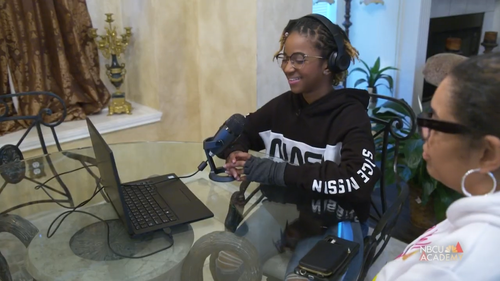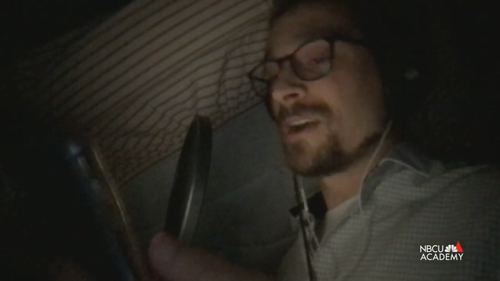NBCU Academy 101
Want to become a podcaster?
Joshua Johnson is an expert. He is host of “NOW Tonight” on NBC News NOW and was host of NPR’s “1A” and KQED/PRI’s “Truth Be Told” podcasts. For invaluable information, see his tips in the video above or read an excerpt of the transcript below.
Podcasting is exploding right now, for the same reason that broadcasting exploded back in 1926 when NBC was founded (we are the original broadcast network). The reason why I think people got so into radio at the time before television is because we like to hear each other. We like to know what’s going on in other people’s lives, other people’s parts of the country and other people’s homes and bedrooms. Now you can tell those same kinds of intimate stories, not with a radio or a TV, but with earphones and earbuds. It’s even more intimate than broadcasting has ever been.

You can make a podcast on a smartphone. Use your Voice Memos app. There’s no law saying you have to have a big fancy microphone, an expensive mixer and the most expensive audio editing program on the market. In order to make a podcast, you need great content. What are you actually saying? And why should I listen?
You benefit from knowing your audience. Probably one of the biggest shortcomings of a lot of podcasts is that they are made for the host with no idea who the audience is going to be. Make a profile of them. How old are they? In what part of the country or the world do they live? What do they like to do? What other podcasts are they listening to, other than yours? And what need can you provide that other shows aren’t doing?
Before you record your podcast
Take a breath.
Drink some water. I recommend room temperature rather than cold water, which can chill your vocal cords.
Warm up your voice, lips and mouth. Flap your lips and stretch and trill your tongue. First read the script really fast, then read it one word at a time per second and then read it normally. All these things force your brain to kind of shut off and your body to turn on.
It’s OK to be nervous. I guarantee you the first time you sit in front of a microphone, you’re going to be very tense. Just take a breath and record. This is not rocket science, it’s not brain surgery. No one’s gonna owe you money. If you mess up the podcast, nobody’s gonna die. Just do it and try to enjoy it.
Know what you’re going to talk about. Even if it’s an interview, you might go in a couple of different directions. Have a basic thread written down somewhere along with some questions.
Radio is a visual medium. If I describe something to you, you’re going to start to picture it in your head. The words you use are almost more vital in a podcast than they are on television, so think about what you’re saying. What pictures, thoughts or emotions do you want it to kindle in your audience, and what you want them to remember?
What is the stickiest part of your show? If your listeners forget everything else that they listen to, what are the 20 seconds of your podcast that you want them to tell a friend about? If you can figure out those 20 seconds, maybe build your podcast around that time and work backwards from there.
Recording your podcast

Have a timer with you. Decide how long you want your podcast to be and stick to it. Do not let yourself ramble. Just because you have infinite time doesn’t mean I have infinite attention.
One of the first assignments I would suggest to anyone who’s trying to do a podcast is to use your phone’s Voice Memo function to make a podcast that is exactly five minutes long. Not 4:59, not 5:02, but 5:00. At precisely five minutes, stop, play that back and share it with someone. Often people will want to make an hour-long podcast without knowing what they’re going to fill the hour with. I’d rather hear five minutes and go, “I wish I could hear another hour of this,” than to get an hour and after five minutes think, “How much longer is this hour?”
Cut down background noise. It won’t be until you start recording that you realize just how loud your air conditioner, heater or the car that’s idling outside are. There is noise everywhere. One of the easiest tricks is to throw a blanket over your head and record underneath the blanket. Maybe stand in a closet that’s got clothes on all sides, so they can help muffle the sound. If you can’t get away from the noise, then record about a minute to 90 seconds of room tone, or the sound of the room. During editing you can lay a track of room tone underneath your interview, so if you have to make cuts they won’t sound abrupt.
Be yourself. If you’re trying to be a carbon copy of someone else, your audience will sense it and turn you off. Maybe the first thing you have to figure out in a podcast is who you are within it and what you want to bring that’s authentic to you. It was a huge shift for me when I realized I didn’t want to be the next Lester Holt, I wanted to be the first Joshua Johnson.
Three takeaways
1. Know why you’re doing this podcast. What is the point of doing this show?
2. Good audio quality is not negotiable. If your podcast has bad audio quality, I don’t want to hear it.
3. Publish the podcast! It does not count if no one hears it. I don’t care how nervous you are, or how much you think it sucks. You have to publish it. If it matters to you, give someone else a chance to let it matter to them too. If you thought it was important enough to record, then let somebody hear it!


